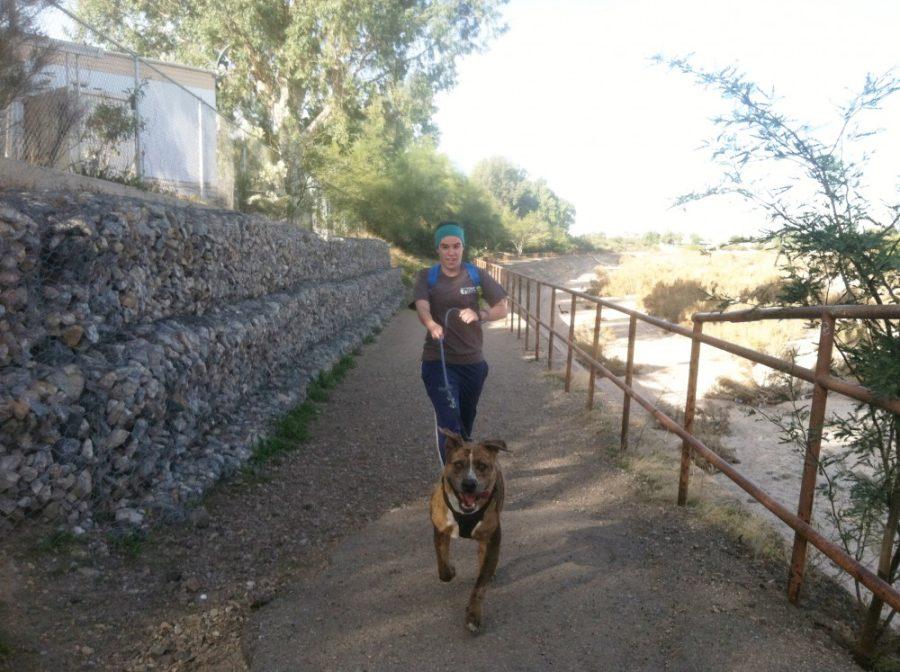The humane society Jog-a-Dog program is off-and-running and a UA study plans to join in on the fun.
It’s about that time: New Year’s resolutions are going go into full effect. If your New Year’s resolution has anything to do with working out and getting in shape, however, you have a chance to help another’s life. The Humane Society of Southern Arizona will have orientation for its Jog-a-Dog volunteer program Saturday.
“It’s an informational session so that people know what they are getting into and how the program runs, no pun intended,” said Aaron Fisher, volunteer manager of HSSA.
The one-hour orientation will compose of an overview on HSSA followed by a lesson on basic dog-handling skills such as learning how to read and respond to dog behavior. The orientation consists of a one-time orientation fee of $15, which covers liability insurance for volunteers and includes a HSSA volunteer T-shirt.
Although the orientation will have information primarily about the Jog-a-Dog program, those interested in more volunteer opportunities are encouraged to take the two-hour volunteer orientation class, according to Fisher.
“Despite our best efforts, [the dogs] are still kenneled the majority of the day,” Fisher said. “So if they can have a productive, well socialized outlet for their energy—running with a person, getting some extra love and extra exercise—it only helps them because they show better and as a result are more adoptable.”
The current window for volunteers to jog the dogs is Tuesday, Thursday and Saturday from 7:30-10 a.m. However, HSSA is currently working on coming up with more afternoon times, which are expected to start at the end of this month.
While the program establishes a fun way for volunteers and dogs at the shelter to engage in an active and fun way, there may be a scientific reason to the program’s benefits. Researchers at the UA will begin studying the potential effects that increased activity in shelter dogs can have on their adoptability. The study will start later this month and is currently offering volunteer opportunities for those interested.
David Raichlen, a UA anthropology associate professor, Stacey Tecot, a UA anthropology assistant professor and Evan MacLean, senior research scientist and co-director of the Duke Canine Cognition Center at Duke University, will conduct The Effects of Aerobic Exercise on Stress and Behavior in Canine Living in Animal Shelters study. MacLean will start as a UA assistant professor in the fall semester.
The study envisions that during the HSSA’s Jog-a-Dog program, the jogger will pick up dog feces to be brought back for analyzing in an endocrinology lab. No scientific background is required for the volunteers who wish to be involved in the poop-scooping process.
“We will start looking at cortisol, it is a hormone that indicates the movement of energy in your body to deal with a stressor,” Tecot said.
According to Raichlen, the study plans to see if higher levels of exercise provide a greater improvement to dogs’ stress and anxiety levels than low intensity walking or no exercise at all.
“Our involvement is basically to help provide the scientific expertise to collect stress data from dogs and compare the running dogs with walking dogs and to see whether we can help figure out what level of exercise gives the best improvement in overall temper, behavior and mood,” Raichlen said.
Tecot added that the ultimate goal is “making their lives a little bit better in the shelter and hopefully decreasing their time to adoption.”
The researchers hope to include a variety of data over time, from statistics to other behavioral measurements. It will start by looking at the physiological markers of stress, an area in which Tecot specializes.
“For students, for those of us with busy lives, exercise can only have a positive effect,” Fisher said. “If we can do that with shelter dogs and do some volunteering at the same time, then I think we have combined a number of positive ingredients all in one.”
The Jog-a-Dog orientation will take place Saturday from 2-3 p.m. at the HSSA, located at 3450 N. Kelvin Blvd., in the north conference room.
For more information on the Jog-a-Dog program and other ways to get involved, visit hssaz.org/get-involved. For more information on volunteering with The Effects of Aerobic Exercise on Stress and Behavior in Canine Living in Animal Shelters study, contact Sky Sobol at skysobol@email.arizona.edu.
Follow Victoria Teplitz on Twitter









